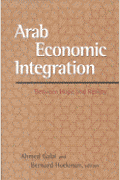Improving the economic performance of Arab countries is now more critical than ever. The region faces high population growth rates, rising unemployment, and modest economic growth coupled with increasingly intense competition from emerging markets in eastern Europe, Latin America, and Asia. Meeting these challenges requires finding ways to overcome political obstacles that impede socially beneficial economic reforms. Despite fifty years of repeated attempts at Arab economic integration, the results in terms of intraregional trade and investment flows have been very modest. This book explains why and discusses possible ways forward. The authors draw especially on the success of the European Union to assess the scope of Arab economic integration as an instrument for narrowing the persistent gap between the region¡¯s economic potential and its performance.
Ahmed Galal is Private Sector Development Adviser at the World Bank and a member of the Board of the Egyptian Center for Economic Studies. Bernard Hoekman is research manager, International Trade, in the World Bank's Development Research Group. He is also a research fellow of the Centre for Economic Policy Research, London.

